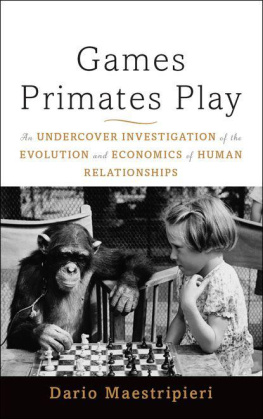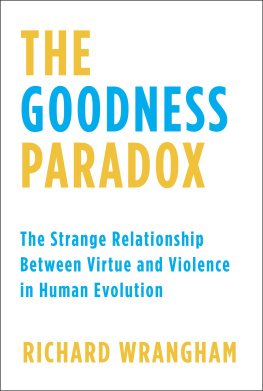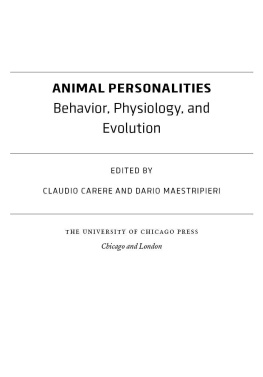
GAMES PRIMATES PLAY
ALSO BY Dario Maestripieri
Macachiavellian Intelligence:
How Rhesus Macaques and Humans
Have Conquered the World

DARIO MAESTRIPIERI
BASIC BOOKS
A Member of the Perseus Books Group
New York
Copyright 2012 by Dario Maestripieri
Published by Basic Books,
A Member of the Perseus Books Group
All rights reserved. No part of this book may be reproduced in any manner whatsoever without written permission except in the case of brief quotations embodied in critical articles and reviews. For information, address Basic Books, 387 Park Avenue South, New York, New York 10016-8810.
Books published by Basic Books are available at special discounts for bulk purchases in the United States by corporations, institutions, and other organizations. For more information, please contact the Special Markets Department at the Perseus Books Group, 2300 Chestnut Street, Suite 200, Philadelphia, PA 19103, or call (800) 810-4145, ext. 5000, or e-mail .
Designed by Pauline Brown
Typeset in 12 point Goudy Std by the Perseus Books Group
Library of Congress Cataloging-in-Publication Data
Maestripieri, Dario.
Games primates play : an undercover investigation of the evolution and economics of human relationships / Dario Maestripieri.
p. cm.
Includes bibliographical references and index.
ISBN 978-0-465-02930-3
(e-book) 1. Interpersonal relations. 2. Dominance (Psychology) 3. Control (Psychology) I. Title.
HM1106.M333 2012
155.7dc23
2011045523
10 9 8 7 6 5 4 3 2 1
For my children,
Elena, Luca, and Sarah
CONTENTS
I n the Academy Awardnominated 2009 film Up in the Air , the protagonist, Ryan Binghamplayed by actor George Clooneyis a corporate layoff expert who travels from city to city, firing employees for corporations that are downsizing their personnel owing to the bad economy. Bingham spends his life on airplanes and in airports around the country. He never checks any luggage and fits all he needs for his travels in a small carry-on bag he packs automatically and wheels around with great ease. Packing light is also his life philosophy. When hes not busy firing people, he gives inspirational lectures in which he tells audiences that life is easier and happier without heavy baggage. People are dragged down, he says, by owning properties and maintaining social relationships. He doesnt own a house, or furniture, or any belongings that dont fit into his bag. He has no wife or girlfriend, no friends, and never sees or talks with his sisters or any other family members. Needless to say, life teaches Bingham a lesson: the happiness of traveling without baggage is an illusion. When he falls in love with a fellow traveler, he experiences the real happiness of love and companionship, and when the relationship ends he feels the keen pain of loss and realizes that being alone isnt so fun after all.
Unlike Ryan Bingham, most people dont live up in the air where, by constantly being on the move, they might choose not to have stable relationships with others. Instead, most of us generally maintain lifelong relationships with our parents, siblings, children, and other relatives. We also establish and keep up relationships with our romantic partners, friends, coworkers, and even people weve met only on Facebook. Moreover, many of us have intense and long-lasting social bonds with our dogs, cats, and other pets. According to my University of Chicago colleague John Cacioppo, who wrote a book called Loneliness: Human Nature and the Need for Social Connection , we all need good social relationships to live a long, healthy, and happy life. People who dont have good relationships with others might think that they are happy, but generally they are not.
Even when we are alone, relationships play a central role in our lives. For instance, while traveling for business, working out at the gym, or lying in bed with insomnia in the middle of the night, our thoughts revolve around relationships: we remember and revisit past events involving ourselves and other people, plan social strategies, or worry about potential future social failures. And as if what goes on in our own relationships were not enough to keep us busy twenty-four hours a day, we also gossip about the relationships of other people we know and even enjoy following the relationships of people we dont know on reality television or in People magazine. Relationships have a pervasive influence on all aspects of our lives and affect our thoughts, our emotions, and our health virtually from the cradle to the grave.
Human social relationships can be good or bad, strong or weak, symmetrical or asymmetrical, and everything in between. The characteristics of a relationship between two people are by no means solely the result of their unique personalities, the history of their previous interactions, or the context in which their relationship takes place. Relationships have a life of their own: they begin in a certain way, develop along a certain trajectory, get stronger or weaker over time, and then stabilize or end in predictable ways. Whether they are parent-child relationships, sibling relationships, same-sex or opposite-sex friendships, romantic relationships with or without children, professional relationships, or competitive relationships, all relationships have their own distinctive patterns.
In his best-selling 1964 book Games People Play , psychiatrist Eric Berne makes the case that when people interact with their family members, friends, coworkers, or strangers, they do so according to specific patterns that are governed by particular rules and usually characterized by predictable outcomes. Calling these patterns games, Berne points out that the predictability of these patterns and outcomes stems from our tendency to assume particular social roles in relationships (for example, the Child, the Parent, or the Adult) and that these roles are associated with certain behaviors. Therefore, relationships that involve the same role pairssuch as the Child and the Parenthave a lot in common.
Not surprisingly, our understanding of human relationships has evolved significantly in the half-century since Bernes book was published. Research in psychology and psychiatry has shown that our behavior in social relationships is the result of complex interactions between our genes and our environment and the effects of these interactions on our brains, emotions, and thoughts. In analyzing the complexities of human relationships with increasing (sometimes microscopic) precision, however, researchers appear to have lost interest in their general underlying patterns. They no longer ask why these patterns exist or where they come from. To answer these questionsindeed, to identify the patterns at allwe must step out of the laboratory and take a good look at people and their relationships in the context of other life forms and their behaviors. In other words, we need to venture out of psychology and into biology. Why? Because many of the rules and patterns underlying human relationships developed through evolutionary processes, and those same evolutionary processes have produced similar patterns in other animal species.
As an evolutionary biologist who has studied animal social behavior for almost thirty years, I can attest to the fact that many of the games played by people are also played by other animals. And you dont have to take my word for it. Tens of thousands of studies of animal social behavior conducted in myriad different species during my lifetimeI was born in 1964, the year Games People Play was publishedhave shown that all social animals have relationships with members of their own species. These relationships may be few or many in number, and they may be simple or complex, depending, among other things, on whether the animals live in small or large groups, whether they have a short or long life span, and whether they have a small or large brain relative to the size of their body. Humans are more similar in these characteristics to closely related primatessuch as chimpanzees and gorillas, or even macaques and baboonsthan to other animals. Therefore, human relationships have a lot more in common with the relationships of these primates than with those of other animals. In short, the games we play with each other are not unique to our species. Other primate species play the same games, or very similar ones. These games were invented neither by us nor by any of the other primate species. Rather, our shared primate ancestors had been playing these games long before the appearance of Homo sapiens on this planet. Thus, in order to fully understand human relationships, we must first understand that human nature is a particular, specialized version of a more general primate nature.
Next page






